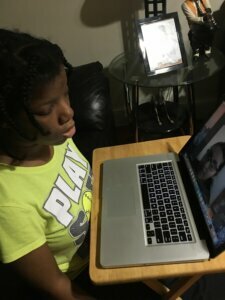Parents across the U.S. are realizing just how hard it can be to educate a child now that so many schools have had to close and transition into distance learning during the coronavirus pandemic.
And schools serving students with special needs have been uniquely challenged, as many of their students have a variety of other considerations to take into account that most schools don’t, before they can open their classrooms up again.
That’s especially true at St. Coletta, a public charter school in D.C. that also serves as a private school for children from Maryland and Virginia.
“We have had students that are on oxygen, we have students that have regular nebulizer treatments, we have students that have seizure disorders,” said principal Christie Mandeville.

“We have students that have a number of more rare, genetic and chromosomal disorders that really make them more susceptible to getting illness, and when they do get sick, they tend to get very sick and end up hospitalized. We definitely have a very vulnerable population,” Mandeville said.
Serving students with cognitive and physical disabilities makes distance learning harder than it would for most other students.
“It’s a very hands-on program, and that doesn’t transition well to an online platform,” Mandeville said. “We have been very creative in doing our video sessions and reaching out to families and showing them how.”
For students learning functional life skills, there are more opportunities at home to translate instruction into practice. Technology has let some students adapt with success.
“It has worked out not just well, but very, very well,” said Deborah Sutton, whose 16-year-old granddaughter, Tavashea Shaw, is a student at St. Coletta.
Through programs such as Zoom, Sutton said her granddaughter is still able to have “group therapy sessions, she has her speech therapy, and then she has regular teaching.”
“It’s like she’s still at school,” Sutton added.
She said she’ll have no hesitation about sending her granddaughter back to St. Coletta’s whenever the doors open, but how to do that safely is something still being worked out.
For one, Mandeville said even students who aren’t immunocompromised don’t have the ability to “maintain proper hygiene, and for example, social distancing. That’s not something that is feasible for many of our students. Number one, they just don’t understand ‘stay 6 feet apart.’ They’re not going to tolerate a mask on when they’re in different settings.”
Mandeville said the school has been in constant contact with D.C. leaders and health professionals about how the school eventually would be able to reopen, but to say there’s a plan in place ready to go right now just wouldn’t be true.
“It’s sort of unknown what the reopen status is going to be,” Mandeville said. “I think the biggest concern is the safety of students and staff, and being able to have people come back to a school building when you still have this virus out there and how do you keep people safe.”
Another wild card is staff who might have kids and other situations at their own homes that makes it harder for them to go back to the school building every day.
“I think, until we get more guidance from health experts, I don’t think we can make any firm decisions yet,” Mandeville said. “There is no other all-special education public charter school, so a lot of times, decisions that are made for a general blanket policy or rule or regulation or guidance … we don’t necessarily fit that.”








